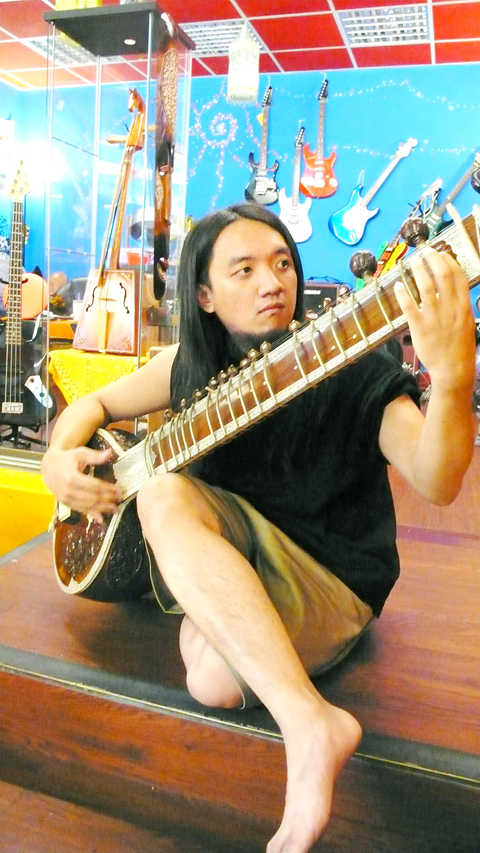His long black hair flows down over his shoulders and his dark beard brushes the instrument he is holding. He looks off into the distance, conjuring up images of ocean waves, as he strums the strings of his sitar.
“When the Pacific Ocean is my audience, I am the greatest musician in the world because there’s no better audience than the sea,” 29-year-old Azer Wu (吳欣澤) says.
Wu, born to Hakka and Aboriginal parents, is Taiwan’s first professional sitar player and founder of a band that features sitar music.

PHOTO: CNA
He was one of the first participants in the “Wanderer” program initiated by the founder of Cloud Gate Dance Theater, Lin Hwai-min (林懷民), to provide funding to young artists and encourage them to follow their dreams.
As a teen, Wu was a guitarist with a string of national music prizes under his belt. Like most young guitar players in Taiwan, he was interested in rock music. When he was in senior high school, he joined a heavy metal band.
But one day he walked out of the practice room with an earache and went to a music store in search of something different.
“I asked the shop assistant to give me something special,” Wu said. “He handed me a dust-covered CD by someone called Shahid Parvez.”
Wu said he had no idea who Parvez was, but the CD cover showed a man playing a sitar.
“When I played the CD, it sounded to me like the Indian man on the cover was tuning a string instrument,” he said.
Wu stuck the CD on a shelf and didn’t think about it again for years. One night, when he was around 20, unable to sleep, he picked up the CD and played it again.
“All of a sudden, I was hearing this music that sounded like it was flowing from planets in a vast universe. It was peaceful and created such an atmosphere of harmony and tranquility that I was enchanted,” he said.
It was the start of Wu’s love affair with an instrument that is by no means part of the mainstream local music scene.
In Wu’s own words, “it sounds like a cat and looks like a centipede, but it’s super cool.”
Wu bought his first sitar in 2003 as a Christmas gift to himself. He set about teaching himself to play the instrument by listening to the Parvez CD. Within a few months he was able to play well enough to launch a band called Siyu Sitar featuring music he created on the exotic instrument.
However, for Wu, this was just the beginning of what he described as a wanderer’s journey.
In January 2005, he left for India with the intention of learning classical sitar. While wandering along the Ganges River one day in India’s cultural capital Varanasi, he encountered a sitar player known as Papa Mori.
“Papa Mori was 75 years old and he played the sitar slowly and gently, producing music more touching than anything I had ever heard on any CD,” Wu said.
Wu became a student of Papa Mori, learning much more than just classical sitar. But first, Wu had to learn the proper posture for playing the instrument.
“Playing the sitar is closely related to yoga and meditation — if one is not in the right position one cannot produce the perfect sound,” Wu said.
“In the beginning, I could only hold the position for about three minutes before losing all feeling in my legs,” he said.
The proper pose is to sit on the floor with one leg crossed over the other, a position that Wu said was “pure torture” at first.
“Now I can sit that way for hours without shifting,” he added.
Papa Mori believed that if a sitar player grew tired while sitting in that position, it was because the heart was uneasy, and when the heart is uneasy there will be pain in the legs, Wu said.
Wu also learned how to breathe properly while playing the instrument. He was taught how to slow down and that the most important training in learning the sitar was not physical but mental.
“As long as there was a sitar, there was no problem of communication,” Wu said, noting that he and his teacher did not share a common language.
Through Papa Mori’s teachings, he said, he came to understand that the pure and simple melodies of the sitar reflect the player’s state of mind.
Since he returned from that first two-month trip to India, Wu has been going back every year to improve his sitar skills and to reconnect with the vision of life that he found there.
“Before I went to India, I lived for no one but myself. But I have since found that man has unlimited potential, and I want to use mine to do something for my country,” he said.
With this goal in mind, Wu and Siyu Sitar started a program in 2007 to collect, refurbish and donate musical instruments to young people in Aboriginal communities, other disadvantaged teens and to schools that lack resources. They also give sitar lectures at universities and to community groups and visit remote areas to perform for elementary school students.
Wu’s studio in Taipei is open to youths who want to rehearse or learn to play an instrument. For some youths on the street, it has become a sanctuary where they can also have free guitar lessons.
“It is better that they hang out here rather than on the street, where they would be exposed to crime, drugs and gangs,” Wu said.
Despite all the charity work it does, Siyu Sitar does not accept donations, he said.
The band’s two albums, Heartbeat of Asia and River of Memories, released last year and this year respectively, are the first sitar CDs ever recorded by a Taiwanese group.
For Wu, the goals ahead are not to make money or to try to earn a living from his music.
“I just want to play music for the mountains, for the sea, even for the Formosan deer,” he said.

Hong Kong singer Eason Chan’s (陳奕迅) concerts in Kaohsiung this weekend have been postponed after he was diagnosed with Covid-19 this morning, the organizer said today. Chan’s “FEAR and DREAMS” concert which was scheduled to be held in the coming three days at the Kaohsiung Arena would be rescheduled to May 29, 30 and 31, while the three shows scheduled over the next weekend, from May 23 to 25, would be held as usual, Universal Music said in a statement. Ticket holders can apply for a full refund or attend the postponed concerts with the same seating, the organizer said. Refund arrangements would

Former president Tsai Ing-wen (蔡英文) on Monday called for greater cooperation between Taiwan, Lithuania and the EU to counter threats to information security, including attacks on undersea cables and other critical infrastructure. In a speech at Vilnius University in the Lithuanian capital, Tsai highlighted recent incidents in which vital undersea cables — essential for cross-border data transmission — were severed in the Taiwan Strait and the Baltic Sea over the past year. Taiwanese authorities suspect Chinese sabotage in the incidents near Taiwan’s waters, while EU leaders have said Russia is the likely culprit behind similar breaches in the Baltic. “Taiwan and our European

Taiwanese indie band Sunset Rollercoaster and South Korean outfit Hyukoh collectively received the most nominations at this year’s Golden Melody Awards, earning a total of seven nods from the jury on Wednesday. The bands collaborated on their 2024 album AAA, which received nominations for best band, best album producer, best album design and best vocal album recording. “Young Man,” a single from the album, earned nominations for song of the year and best music video, while another track, “Antenna,” also received a best music video nomination. Late Hong Kong-American singer Khalil Fong (方大同) was named the jury award winner for his 2024 album

The US Department of State on Monday reaffirmed that US policy on Taiwan remains unchanged, following US President Donald Trump’s use of the term “unification” while commenting on recent trade talks with China. Speaking at a wide-ranging press conference, Trump described what he viewed as progress in trade negotiations with China held in Geneva, Switzerland, over the weekend. “They’ve agreed to open China — fully open China, and I think it’s going to be fantastic for China. I think it’s going to be fantastic for us,” Trump said. “I think it’s going to be great for unification and peace.” Trump’s use of the